- Home
- Harlan Coben
Harlan Coben 3 Novel Collection Page 56
Harlan Coben 3 Novel Collection Read online
Page 56
Silence.
“I shouldn’t have said that,” I said.
Her voice was soft. “You don’t know anything about my life.”
“I know. I’m sorry. It’s none of my business.”
“Those DUIs were a long time ago.”
I said nothing. She turned away from me and looked out the window. We drove in silence.
“You may be right,” I said.
Her eyes stayed on the window.
“Here is something I’ve never told anyone,” I said. I felt my face flush and the tears push against my eyes. “After the night in the woods, my father never looked at me the same.”
She turned toward me.
“I could have been projecting. I mean, you’re right. I did blame myself to some degree. What if we hadn’t gone off? What if I had just stayed where I was supposed to? And maybe the look on his face was just the pure devastation of a parent losing a child. But I always thought there was something more in it. Something almost accusatory.”
She put a hand on my arm. “Oh, Cope.”
I kept driving. “So maybe you’re on to something. Maybe I do need to make amends for the past. But what about you?”
“What about me?”
“Why are you delving into this? What do you hope to gain after all these years?”
“Are you kidding?”
“No. What are you after exactly?”
“The life I knew ended that night. Don’t you get that?”
I said nothing.
“The families—including yours—dragged my father into court. You took away everything we had. Ira wasn’t built for that kind of hit. He couldn’t take the stress.”
I waited for her to say more. She didn’t.
“I understand that,” I said. “But what are you after now? I mean, like you said, I’m trying to rescue my sister. Short of that, I’m trying to find out what really happened to her. What are you after?”
She didn’t reply. I drove some more. The skies were starting to darken.
“You don’t know how vulnerable I feel being here,” she said.
I wasn’t sure how to answer that. So I said, “I would never hurt you.”
Silence.
“Part of it is,” she said, “it feels like I lived two lives. The one before that night, where things were going pretty well, and the one after, where things aren’t. And yeah, I know how pathetic that sounds. But sometimes it feels like I was pushed down a hill that night and I’ve been stumbling down ever since. That sometimes I sort of get my bearings but the hill is so steep that I can never really get balanced again and then I start tumbling again. So perhaps—I don’t know—but perhaps if I figure out what really happened that night, if I can make some good out of all that bad, I’ll stop tumbling.”
She had been so magnificent when I knew her. I wanted to remind her of that. I wanted to tell her that she was being overly melodramatic, that she was still beautiful and successful and that she still had so much going for her. But I knew that it would sound too patronizing.
So instead I said, “It’s so damn good to see you again, Lucy.”
She squeezed her eyes shut as though I had struck her. I thought about what she said, about not wanting to be too vulnerable. I thought about that journal, all that talk about not finding another love like that, not ever. I wanted to reach out and take her hand, but I knew for both of us right now, it was too raw, that even a move like that would be too much and not enough.
CHAPTER 24
I DROPPED OFF LUCY BACK AT HER OFFICE.
“In the morning,” she said, “I’ll visit Ira and see what he can tell me about Manolo Santiago.”
“Okay.”
Lucy reached for the door handle. “I have a bunch of papers to correct.”
“I’ll walk you in.”
“Don’t.”
Lucy slipped out of the car. I watched her walk toward the door. My stomach tightened. I tried to sort through what I was feeling right now, but it just felt like a rush of emotion. Hard to distinguish what was what.
My cell phone rang. I looked at the caller ID and saw it was Muse.
“How did it go with Perez’s mother?” Muse asked.
“I think she’s lying.”
“I got something you might find interesting.”
“I’m listening.”
“Mr. Perez hangs at a local bar called Smith Brothers. He likes hanging out with the boys, plays some darts, that kind of thing. Moderate drinker from what I hear. But the last two nights, he got really lit up. Started crying and picking fights.”
“Grieving,” I said.
At the morgue, Mrs. Perez had been the strong one. He had leaned on her. I remember that I could see the cracks there.
“And either way, liquor loosens the tongue,” Muse said.
“True enough.”
“Perez is there now, by the way. At the bar. Might be a good place to take a run at him.”
“On my way.”
“There is one more thing.”
“I’m listening.”
“Wayne Steubens will see you.”
I think I stopped breathing. “When?”
“Tomorrow. He’s serving his time at Red Onion State Prison in Virginia. I also hooked you up to meet with Geoff Bedford at the FBI office afterward. He was the special agent in charge of Steubens’s case.”
“Can’t. We have court.”
“Can. One of your associates can handle it for a day. I have you booked on the morning flight.”
I don’t know what I expected the bar to be. Something tougher, I guessed. The place could have been a chain restaurant like T.G.I. Friday’s or Bennigan’s, something like that. The bar was bigger than in most of those places, the dining area obviously smaller. They had wood paneling and free-popcorn machines and loud music from the eighties. Right now Tears for Fears was singing “Head Over Heels.”
In my day, they would have called this a yuppie bar. There were young men in loosened ties and women trying hard to look business-y. The men drank beer out of bottles, trying hard to look like they were having a good time with their buddies while checking out the ladies. The ladies drank wine or faux martinis and eyed the guys more surreptitiously. I shook my head. The Discovery Channel should film a mating special in here.
This didn’t look like a hangout for a guy like Jorge Perez, but I found him toward the back. He sat at the bar with four or five comrades in arms, men who knew how to drink, men who hulked over their alcohol as though it were a baby chick in need of protection. They watched the twenty-first-century yuppies milling about them with hooded eyes.
I came up behind Mr. Perez and put a hand on his shoulder. He turned toward me slowly. So did his comrades. His eyes were red and runny. I decided to try a direct route.
“My condolences,” I said.
He seemed puzzled. The other guys with him, all Latino men in their late fifties, looked at me as though I’d been ogling their daughters. They wore work clothes. Mr. Perez had on a Polo shirt and khaki pants. I wondered if that meant anything, but I couldn’t imagine what.
“What do you want?” he asked me.
“To talk.”
“How did you find me?”
I ignored the question. “I saw your face at the morgue. Why are you lying about Gil?”
His eyes narrowed. “Who you calling a liar?”
The other men stared at me a little harder.
“Maybe we could talk in private.”
He shook his head. “No.”
“You know that my sister disappeared that night, right?”
He turned away from me and grabbed his beer. His back was to me when he said, “Yeah, I know.”
“That was your son in the morgue.”
He still kept his back to me.
“Mr. Perez?”
“Get out of here.”
“I’m not going anywhere.”
The other men, tough men, men who had spent their lives working outdoors and with th
eir hands, glared at me. One slid off his bar stool.
“Sit down,” I said to him.
He didn’t move. I met his eyes and held it. Another man stood and folded his arms at me.
“Do you know who I am?” I said.
I reached into my pocket and pulled out my prosecutor badge. Yes, I have one. The truth is, I am the top law-enforcement officer for Essex County. I didn’t like being threatened. Bullies piss me off. You know the old yarn about standing up to a bully? It was only true if you could back it up. I could.
“You all better be legal,” I said. “Your family better be legal, your friends better be legal. People you accidentally bump into on the streets—they all better be legal.”
The narrow eyes opened a little wider.
“Let me see some ID,” I said. “All of you.”
The one who had stood first put up his hands. “Hey, we don’t want no trouble.”
“Then get lost.”
They threw down some bills and left. They didn’t run, didn’t hurry, but they didn’t want to stick around either. I would normally feel bad about making idle threats, quasi-abusing my power like that, but they had more or less asked for it.
Perez turned to me, clearly unhappy.
“Hey,” I said, “what’s the point of carrying a badge if I don’t use it?”
“Haven’t you done enough?” he asked me.
The bar stool next to him was open. I took it. I signaled for the bartender and ordered a draft of “whatever he’s having,” pointing to Jorge Perez’s mug.
“That was your son in the morgue,” I said. “I could show you the proof, but we both know it.”
He drained his beer and signaled for another. It arrived with mine. I picked up my mug as though to offer a toast. He just looked at me and kept his beer on the bar. I took a deep sip. The first sip of beer on a hot day is like that first finger-dip when you open a new jar of peanut butter. I enjoyed what could only be called God’s nectar.
“There are two ways to play it,” I went on. “You keep pretending it’s not him. I’ve already ordered a DNA test. You know about those, don’t you, Mr. Perez?”
He looked out over the crowd. “Who doesn’t anymore?”
“Right, I know. CSI, all those cop shows on TV. So you know it won’t be a problem for us to prove that Manolo Santiago was Gil.”
Perez took another sip. His hand shook. His face had fault lines now. I pressed on.
“So the question is, once we prove it’s your son, what happens? My guess is, you and your wife will try to peddle some ‘gasp!—we had no idea’ crap. But that won’t hold. You start off looking like liars. Then my people start investigating for real. We check all the phone records, all the bank records, we knock on doors, we ask your friends and neighbors about you, we ask about your children—”
“Leave my children out of it.”
“No way,” I said.
“That’s not right.”
“What’s not right is you lying about your son.”
He shook his head. “You don’t understand.”
“Like hell I don’t. My sister was in those woods that night too.”
Tears filled his eyes.
“I’ll go after you, your wife, your children. I will dig and dig and trust me, I will find something.”
He stared at his beer. The tears escaped and trickled down his face. He didn’t wipe them away. “Damn,” he said.
“What happened, Mr. Perez?”
“Nothing.”
He lowered his head. I moved so that my face was close to his.
“Did your son kill my sister?”
He looked up. His eyes searched my face as if desperately seeking some kind of solace that would never be there. I held my ground.
“I’m not talking to you anymore,” Perez said.
“Did he? Is that what you’re trying to cover up?”
“We’re not covering up anything.”
“I’m not making idle threats here, Mr. Perez. I’ll go after you. I’ll go after your children.”
His hand moved so fast I didn’t have time to react. He grabbed my lapels with both hands and pulled me close. He had a good twenty years on me, but I could feel his strength. I got my bearings quickly enough and, remembering one of the few martial arts moves I learned when I was a kid, slashed down on his forearms.
He released me. I don’t know if my blow did it or it was just a decision on his part. But he let go. He stood. I stood too. The bartender was watching us now.
“You need help, Mr. Perez?” he asked.
I had the badge out again. “You reporting all your tips to the IRS?”
He backed off. Everyone lies. Everyone has stuff they keep buried. Everyone breaks laws and keeps secrets.
Perez and I stared at each other. Then Perez said to me, “I’m going to make this simple for you.”
I waited.
“If you go after my children, I’ll go after yours.”
I felt my blood tick. “What the hell does that mean?”
“It means,” he said, “I don’t care what sort of badge you carry. You don’t threaten to go after a man’s children.”
He walked out the door. I thought about his words. I didn’t like them. Then I picked up my cell phone and called Muse.
“Dig up everything you can on the Perezes,” I said.
CHAPTER 25
GRETA FINALLY RETURNED MY CALL.
I was on my way home, still in the car, and I struggled to find that damn “hands-free” so that the Essex County prosecutor would not be caught breaking the law.
“Where are you?” Greta asked.
I could hear the tears in her voice.
“I’m on my way home.”
“Do you mind if I meet you there?”
“Of course not. I called before—”
“I was down at the courthouse.”
“Did Bob make bail?”
“Yes. He’s upstairs getting Madison to bed.”
“Did he tell you—”
“What time will you be home?”
“Fifteen, twenty minutes tops.”
“I’ll see you in an hour, okay?”
Greta hung up before I could answer.
Cara was still awake when I got home. I was glad for that. I put her to bed and we played her new favorite game, called “Ghost.” Ghost is basically hide-and-seek and tag combined. One person hides. When that person is found, he tries to tag the finder before the finder gets back to home base. What made our version of the game extra-silly was that we played it in her bed. This severely limited your hiding spots and chances to reach home base. Cara would duck under the covers and I would pretend I couldn’t find her. Then she would close her eyes and I would put my head under the pillow. She was as good at pretending as I was. Sometimes I would hide by putting my face right in front of her eyes, so she would see me the second she opened them. We both laughed, well, like children. It was dumb and silly and Cara would outgrow it very soon and I didn’t ever want her to.
By the time Greta arrived, using the key I had given her years ago, I was so lost in the bliss of my daughter that I’d almost forgotten everything—young men who rape, young girls who vanish in the woods, serial killers who slit throats, brothers-in-law who betray your trust, grieving fathers who threaten little girls. But the jangle in the door brought it all back to me.
“I have to go,” I told Cara.
“One more turn,” she pleaded.
“Your aunt Greta is here. I need to talk to her, okay?”
“One more? Please?”
Children will always beg for one more. And if you give in, they will do it again and again. Once you give in, they will never stop. They will always ask for one more. So I said, “Okay, one more.”
Cara smiled and hid and I found her and she tagged me and then I said I had to go and she begged for one more, but I’m nothing if not consistent so I kissed her cheek and left her begging, nearly in tears.
Greta stood at
the bottom of the steps. She wasn’t pale. Her eyes were dry. Her mouth was a straight line that accentuated her already too-prominent jowls.
“Isn’t Bob coming?” I asked.
“He’s watching Madison. And his lawyer is coming over.”
“Who does he have?”
“Hester Crimstein.”
I knew her. She was very good.
I came down the stairs. I usually kissed her cheek. I didn’t today. I wasn’t sure what to do exactly. I also didn’t know what to say. Greta moved toward the den. I followed. We sat on the couch. I took her hands in mine. I looked at that face, that plain face, and, as always, saw angels. I adored Greta. I really did. My heart broke for her.
“What’s going on?” I asked.
“You need to help Bob,” she said. Then: “Help us.”
“I will do whatever I can. You know that.”
Her hands felt ice cold. She lowered her head and then looked straight at me.
“You have to say you loaned us the money,” Greta said in pure monotone. “That you knew about it. That we agreed to pay you back with interest.”
I just sat there.
“Paul?”
“You want me to lie?”
“You just said you would do whatever you could.”
“Are you saying”—I had to stop—“Are you saying Bob took the money? That he stole from the charity?”
Her voice was firm. “He borrowed the money, Paul.”
“You’re kidding, right?”
Greta took her hands away from mine. “You don’t understand.”
“Then explain it to me.”
“He’ll go to jail,” she said. “My husband. Madison’s father. Bob will go to jail. Do you get that? It will ruin all our lives.”
“Bob should have thought of that before he stole from a charity.”
“He didn’t steal. He borrowed. It’s been tough for him at work. Did you know he lost his two biggest accounts?”
“No. Why didn’t he tell me?”
“What was he going to say?”
“So he thought the answer was to steal?”
“He didn’t…” She stopped mid-denial, shook her head. “It’s not that simple. We had signed the papers and committed to the pool. We made a mistake. We overextended.”

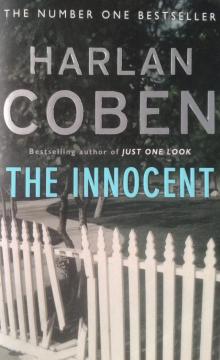 The Innocent
The Innocent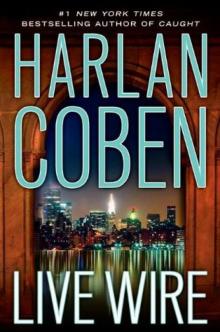 Live Wire
Live Wire Play Dead
Play Dead Drop Shot
Drop Shot Seconds Away
Seconds Away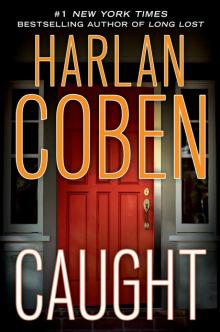 Caught
Caught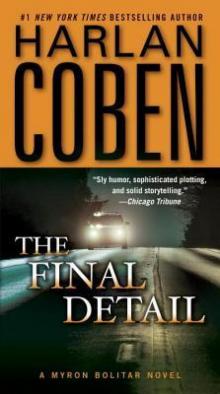 The Final Detail
The Final Detail Fade Away
Fade Away Home
Home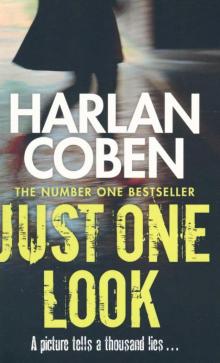 Just One Look
Just One Look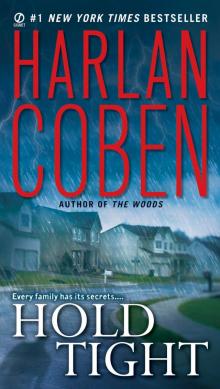 Hold Tight
Hold Tight Fool Me Once
Fool Me Once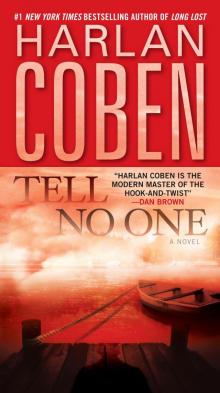 Tell No One
Tell No One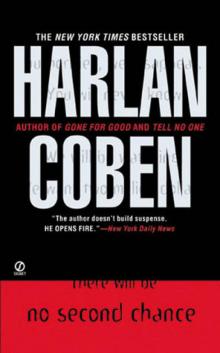 No Second Chance
No Second Chance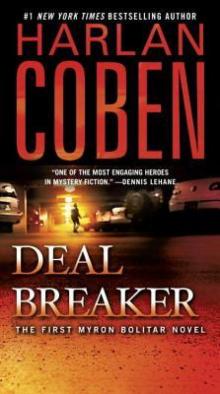 Deal Breaker
Deal Breaker Long Lost
Long Lost One False Move
One False Move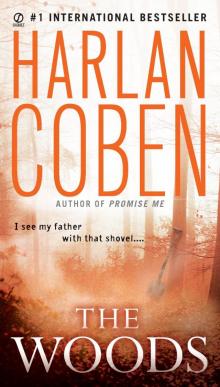 The Woods
The Woods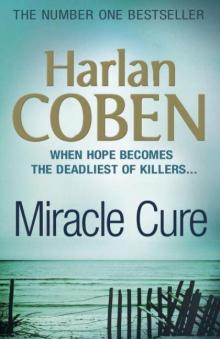 Miracle Cure
Miracle Cure Found
Found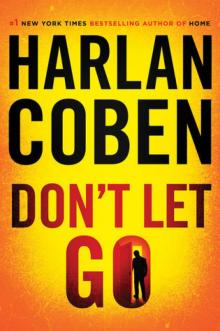 Don't Let Go
Don't Let Go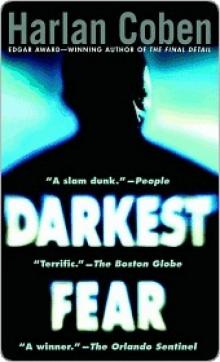 Darkest Fear
Darkest Fear The Stranger
The Stranger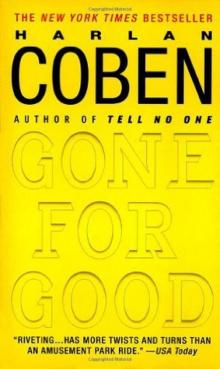 Gone for Good
Gone for Good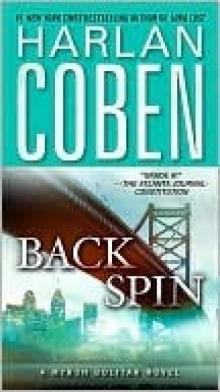 Back Spin
Back Spin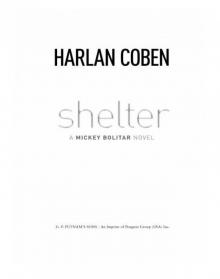 Shelter
Shelter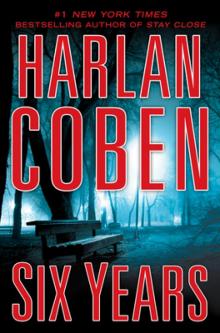 Six Years
Six Years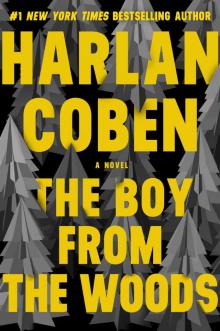 The Boy from the Woods
The Boy from the Woods Missing You
Missing You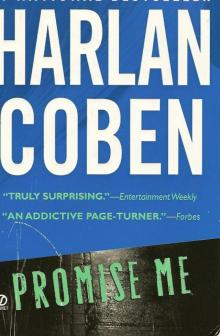 Promise Me mb-8
Promise Me mb-8 The Final Detail: A Myron Bolitar Novel
The Final Detail: A Myron Bolitar Novel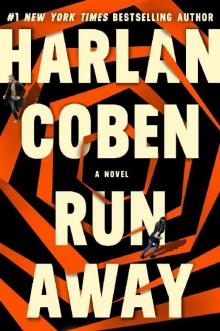 Run Away
Run Away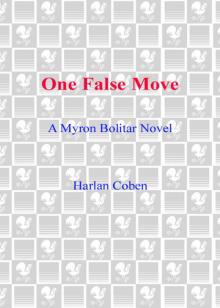 One False Move: A Myron Bolitar Novel
One False Move: A Myron Bolitar Novel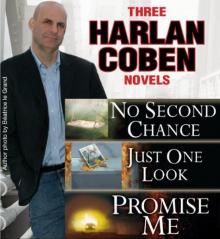 Three Harlan Coben Novels
Three Harlan Coben Novels the Woods (2007)
the Woods (2007) Tell No One (2001)
Tell No One (2001) the Innocent (2005)
the Innocent (2005)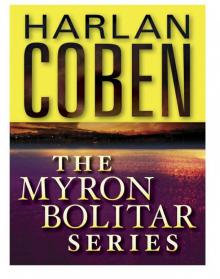 The Myron Bolitar Series 7-Book Bundle
The Myron Bolitar Series 7-Book Bundle Gone for Good (2002)
Gone for Good (2002) Caught (2010)
Caught (2010) Hold Tight (2008)
Hold Tight (2008)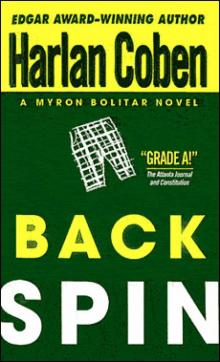 04 - Back Spin
04 - Back Spin Miracle Cure (1991)
Miracle Cure (1991) Harlan Coben 3 Novel Collection
Harlan Coben 3 Novel Collection Just One Look (2004)
Just One Look (2004)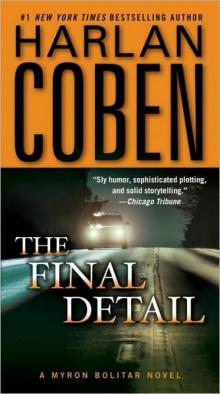 The Final Detail mb-6
The Final Detail mb-6 Play Dead (2010)
Play Dead (2010)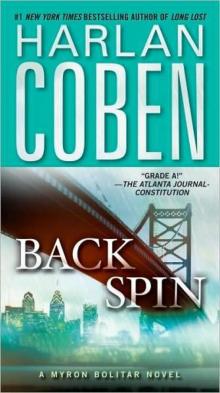 Back Spin mb-4
Back Spin mb-4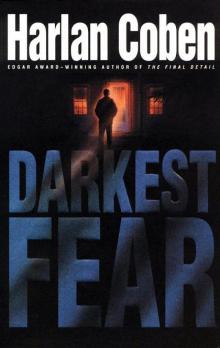 Darkest Fear mb-7
Darkest Fear mb-7